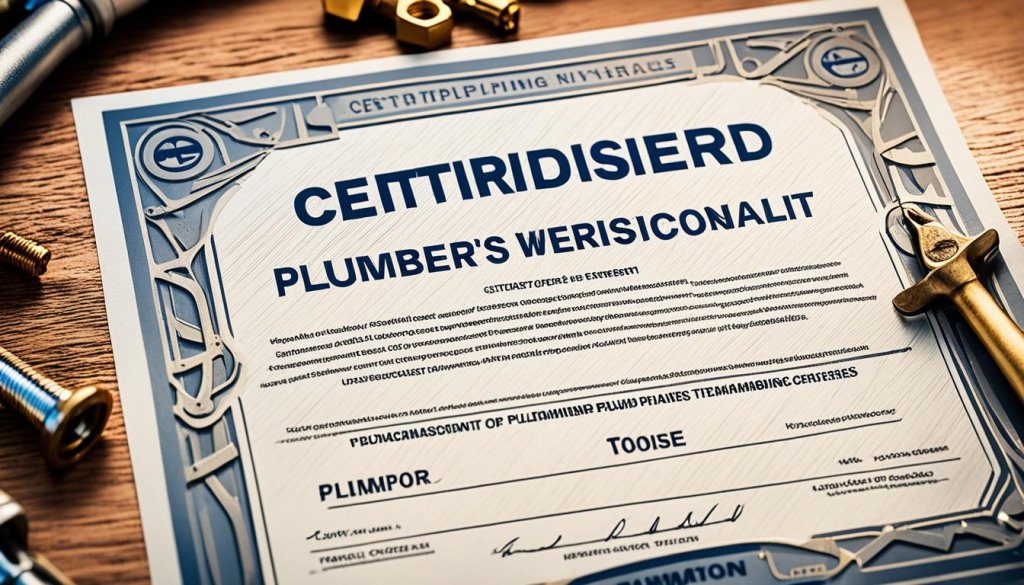When I started my plumbing business, I knew that in order to stand out in the competitive market, I needed to elevate my online presence and boost visibility. After all, 90% of customers look for local businesses online, and I wanted to make sure that my plumbing services were right at their fingertips when they needed them most.
That’s when I decided to implement a content marketing strategy for my plumbing business. I knew that by creating valuable, informative, and engaging content, I could not only attract potential customers but also establish myself as an industry expert.
One of the first steps I took was to optimize my website with relevant keywords such as “plumbers near me,” “unclog drain,” and “fix water leak.” By implementing SEO strategies, I was able to enhance my local search visibility and rank better in search engine results.
But setting clear marketing goals was equally important. I wanted to increase brand visibility, boost lead generation, and enhance customer loyalty and retention. By allocating my funds wisely and focusing on these goals, I could ensure that my marketing efforts were working towards the growth of my business.
To track the effectiveness of my marketing strategies and channels, I utilized tools like Google Analytics and social media platform analytics. This allowed me to measure important metrics such as website traffic, bounce rate, average time on page, social media engagement, lead generation, conversion rate, and email subscriber growth.
Being flexible with my marketing budget was also crucial. I understood the importance of adapting to shifts in market trends, customer behavior, and seasonal demands. For example, I would increase my advertising budgets during peak seasons like winter for services such as emergency pipe repairs or heater installations, capturing the heightened demand.
But marketing my plumbing business wasn’t just limited to digital strategies. I also invested in community engagement activities, such as sponsoring local events or sports teams. This not only enhanced my local brand visibility but also showed my commitment to the community.
By allocating more resources to effective marketing channels like content marketing and email campaigns based on performance data, I was able to retain and engage my customers more effectively.
Through my journey of crafting engaging content, optimizing my online presence, and tracking the effectiveness of my marketing efforts, I was able to witness the growth of my plumbing business. And I believe that any plumbing business can achieve the same success by implementing a strong content marketing strategy.

Key Takeaways:
- Implementing a content marketing strategy can help elevate your plumbing business and boost online visibility.
- Setting clear marketing goals is crucial for allocating funds effectively and achieving desired outcomes.
- Tracking ROI through analytics tools can help you understand the effectiveness of your marketing strategies and channels.
- Being flexible with your marketing budget allows you to adapt to market trends and customer behavior.
- Investing in community engagement activities can enhance your local brand visibility and show commitment to the community.
Setting Goals for Your Plumbing Business
When starting a plumbing business, it’s crucial to set clear and actionable goals. These goals will guide your decision-making, help you prioritize tasks, and measure your progress. Setting goals allows you to stay focused, motivated, and on track to achieve success in your plumbing business.
Before diving into the specifics of your goals, it’s important to understand why you’re starting a plumbing business. Are you looking to increase your income, have more flexible hours, or be your own boss? Identifying your motivations will help shape your goals and ensure they align with your long-term vision.
Short-term goals should be specific, measurable, achievable, relevant, and timely (SMART). For example, you could set a goal to acquire a certain number of new customers each month or complete a specific number of hot water tank installations. By setting these short-term goals, you create momentum and build a solid foundation for long-term success.
Long-term goals should reflect the achievements generated from your short-term goals. For instance, you may aim for a 5% increase in new customers per month or a yearly profit increase. These goals provide a clear vision for the growth and sustainability of your plumbing business.
The Importance of Goal Setting
Goal setting not only aligns your team and resources but also helps you stay ahead of the competition. By setting goals, you can focus your efforts, make informed decisions, and allocate resources effectively. Moreover, goals serve as a benchmark against which you can measure your progress and evaluate your success.
Setting goals is also essential for marketing your plumbing business. By setting specific marketing goals, such as decreasing Customer Acquisition Cost, increasing online reviews, and enhancing website traffic and conversion rates, you can create a marketing strategy that effectively reaches your target audience and drives growth.
Another key aspect of goal setting is monitoring and assessing your progress regularly. By tracking your achievements and adjusting your strategies if needed, you can ensure that you are on the right path to achieving your goals. Regular assessment also allows you to make data-driven decisions and identify areas for improvement.
It’s worth noting that as a plumber, you may find it challenging to set goals due to your focus on technical expertise rather than business management and marketing. However, by recognizing the importance of setting goals and dedicating time to develop a business plan, you can overcome this challenge and position your plumbing business for long-term success.
Registering Your Plumbing Business
Before officially starting your plumbing business, it’s crucial to go through the process of registering it. The registration requirements and procedures will vary depending on your location and the type of business structure you choose.
In the United States, you have several options for registering your plumbing business. One common choice is to establish a sole proprietorship, which is the simplest and most straightforward business structure. As a sole proprietor, you have complete control over your business and its operations. However, keep in mind that you will be personally liable for any business debts or legal issues that may arise.
Another popular option is to form a Limited Liability Company (LLC). An LLC provides a level of personal liability protection for its owners, known as members. This means that your personal assets are generally protected from business liabilities. Additionally, forming an LLC can offer certain tax advantages and make it easier to secure financing.
Regardless of the business structure you choose, it’s important to have a well-thought-out business plan in place. A solid business plan typically includes financial projections, growth opportunities, marketing strategies, and short-term and long-term goals. This plan will help guide your decision-making and set the foundation for your plumbing business’s success.
Registering your plumbing business will also involve complying with any licensing requirements in your area. In North Carolina, for example, the North Carolina State Board of Examiners of Plumbing, Heating and Fire Sprinkler Contractors issues licenses to plumbers in the state. The license classifications vary based on the scope of work authorized, and the exam requirements also differ depending on the type of license being pursued.
When applying for a license, there are fees involved, such as the $100 application fee for a North Carolina plumber’s license exam. License activation fees range from $75 for plumbing technicians to $150 for P-I, P-II, and RLP contractors. It’s important to factor in these costs when budgeting for your plumbing business.
Additionally, securing appropriate insurance coverage is crucial to protect your plumbing business and its work. Workers’ compensation insurance is mandatory for North Carolina employers with three or more employees. You should also consider general liability insurance, tools and equipment insurance, commercial auto insurance, and commercial property insurance. Discuss your insurance needs with a reputable provider to ensure you have adequate coverage.
Remember, each state has its own specific requirements for registering and licensing plumbing businesses, so be sure to research and comply with the regulations in your area.
Training and Qualifications
When starting a plumbing business, having the right training and qualifications is essential. Not only does it demonstrate your expertise and professionalism, but it also enables you to provide high-quality service to your customers. In today’s competitive market, promoting your plumbing qualifications and credentials can set your business apart and attract more clients.
In the United States, the plumbing job market is experiencing steady growth, coupled with a shortage of qualified plumbers. This presents a significant opportunity for skilled professionals like you to establish a successful plumbing business.
To become a licensed plumber in the US, you typically need a combination of education and practical experience. Trade school programs, such as those offered by the Pennsylvania College of Technology, provide comprehensive training and offer certification exams upon completion. These certifications can give you a distinct advantage in the job market and instill confidence in potential clients.
To advance your career and enhance your earning potential, consider obtaining additional qualifications such as a journeyman plumber license. This requires a minimum of four years of apprentice experience under a licensed master plumber, followed by passing a state or local government exam. Similarly, a master plumber license demands at least eight years of experience and passing an exam administered by the authorities.
Specialized certifications can also set you apart in the industry. Backflow prevention certification, green plumbing certification, and medical gas installer certification provide additional training and require passing exams. These certifications show your commitment to staying updated with the latest industry standards and practices.
Aside from acquiring technical skills, it’s important to prioritize safety in your plumbing business. While OSHA training may not be legally required, it ensures a safe working environment for both you and your clients.
Furthermore, expanding your knowledge and skills through professional development courses can benefit your plumbing business. Online platforms offer a variety of plumbing trade courses covering topics such as plumbing fundamentals, safety procedures, and regulatory standards. These courses are available at affordable prices, ranging from $19.00 to $59.00 per course, with varying durations from 0.5 to 3 hours.

LEED Accreditation and Eco-Friendly Practices
If you’re interested in eco-friendly plumbing practices, pursuing LEED accreditation can give your plumbing business a competitive edge. LEED (Leadership in Energy and Environmental Design) certification recognizes professionals who possess the knowledge and skills to implement sustainable and energy-efficient plumbing solutions. To become officially recognized as LEED-certified, you must complete a course covering water conservation techniques and green building principles, followed by a rigorous review process.
Investing in your training and qualifications not only benefits your plumbing business but also contributes to the overall growth and professionalism of the industry. By continuously updating your skills and staying ahead of the competition, you can provide exceptional service and establish a reputable name for your plumbing business.
Finances for Your Plumbing Business
Starting a plumbing business requires careful financial planning and management. As a plumber, you will need to allocate funds for initial expenses such as a vehicle and equipment. If you don’t have enough capital on hand, there are various funding options available to you.
One option is to approach banks or other lenders for a small business loan. Major banks often have dedicated departments for small businesses and offer different financial solutions to support entrepreneurs like you.
Government loan schemes are also worth exploring. These programs provide financial assistance specifically for small businesses, including plumbing businesses. They offer favorable terms and conditions, making it easier for you to secure funding.
Another potential source of funding is angel investors. These individuals or groups of investors are interested in supporting promising businesses and can provide the necessary capital to help you get started.
When seeking financial assistance, it’s crucial to have a well-prepared business plan. A comprehensive business plan demonstrates your understanding of the plumbing industry and your ability to generate revenue. It also shows potential lenders or investors that you have a clear vision for your business’s future.
Once your plumbing business is up and running, managing your finances effectively is essential for success. Here are some key strategies:
1. Invoicing and Payments
Invoice promptly to receive payments sooner and improve cash flow. Timely payment from customers is crucial for maintaining healthy finances. Consider using accounting software like Xero to track cash flow, identify discrepancies, and streamline the invoicing process.
2. Expense Tracking
Managing input costs efficiently is crucial. Track your expenses, materials, and pricing to ensure you’re maximizing profitability. By keeping a close eye on your expenditures, you can identify areas where you can cut costs or negotiate better deals with suppliers.
3. Employee Benefits and Incentives
Investing in your employees can lead to higher quality work and contribute to the overall success of your business. Consider offering benefits and incentives to attract and retain top talent in the industry. Happy employees are more likely to go the extra mile for your customers.
4. Building Long-Term Client Relationships
Establishing ongoing contracts and nurturing long-term client relationships can improve cash flow stability. Repeat business provides a steady income stream and reduces the need for constant marketing efforts. Focus on delivering excellent service and maintaining open lines of communication with your clients.
5. Supplier Relationships
Paying suppliers on time is important to avoid late payment fees and maintain good relationships. Building strong partnerships with suppliers can lead to better pricing and priority access to materials, optimizing your cash flow management.
6. Pricing Adjustments
Regularly review and adjust your pricing based on market trends and costs. Staying competitive requires staying informed about industry developments and adjusting your rates accordingly. Striking the right balance between competitive pricing and profitability is crucial for long-term success.
7. Budgeting and Forecasting
Utilize budgeting and forecasting tools to plan your finances and make informed decisions. These tools can help you anticipate cash flow needs, identify potential challenges, and set realistic financial goals for your plumbing business.
By implementing these strategies and managing your finances effectively, you can create a solid financial foundation for your plumbing business and set yourself up for long-term success.
Marketing Your Plumbing Business
When it comes to running a successful plumbing business, effective marketing plays a crucial role in attracting and retaining customers. With the right strategies in place, you can increase your online presence, build brand awareness, and create a positive reputation in the industry.
One of the most powerful marketing tactics is harnessing the power of word-of-mouth. According to a study conducted by the Word of Mouth Marketing Association (WOMMA) and the American Marketing Association (AMA), 64% of marketing executives believe word of mouth is the most effective form of marketing. Additionally, Nielsen reports that 92% of consumers trust recommendations from friends and family over all forms of advertising. To leverage this, focus on delivering exceptional service to earn customer testimonials and encourage satisfied clients to spread the word about your reliable plumbing services.
Creating an online presence is equally important in today’s digital age. About 72% of buyers turn to Google when researching solutions, including professional services like plumbing. To increase your visibility, invest in search engine optimization (SEO) to improve your website’s ranking on search engine results pages. Since only about 8% of users will click past the first page of Google search results, it’s crucial to optimize your website to appear in top positions.
A mobile-friendly website is another must-have for your plumbing business. In 2019, American adults spent an average of 3 hours and 30 minutes a day using a mobile device to search online, and this time is expected to increase to over 4 hours in 2021, according to Zenith Media. By creating a mobile version of your website, you can cater to the growing number of mobile users and increase your website visits and conversions.
Utilizing the AIDA (Awareness, Interest, Desire, Action) sales funnel approach can also be effective in converting website visitors into paying clients. By capturing their attention with compelling content and showcasing your expertise, you can generate interest, build desire for your plumbing services, and ultimately prompt them to take action by contacting you for their plumbing needs.
Another key aspect of marketing your plumbing business is building a strong brand identity. Develop a memorable logo, consistent color palette, and a unique brand voice to establish your plumbing business as a trusted and professional provider. Incorporate your branding across all marketing channels, including your website, social media profiles, and printed materials, to ensure a cohesive and recognizable presence.
Finally, don’t underestimate the power of online reviews. 93% of customers reported that online reviews about a business impacted their buying decision. Encourage satisfied customers to leave reviews on platforms like Google My Business, Yelp, and HomeAdvisor. Highlighting positive testimonials and reviews can significantly impact your reputation and attract new customers.
Remember, successful marketing requires continuous effort and a dedicated budget. Experts recommend that plumbing contractors dedicate at least 10% of their sales towards their plumbing marketing budget. A 5% budget is considered a small “maintenance” budget with minimal results. By investing in strategic marketing efforts, tracking leads, and analyzing performance, you can measure the success of your digital marketing strategy and make informed decisions to further enhance your plumbing business.
Networking and Collaboration in the Plumbing Industry
Collaborating with other businesses in the plumbing industry can also be beneficial for marketing your services. By networking with suppliers, contractors, and other professionals in related fields, you can leverage their contacts and referrals to expand your reach. Partnering with complementary businesses, such as construction companies or interior designers, can also lead to mutually beneficial collaborations and attract new customers who require plumbing services.
In conclusion, marketing is key to the success of your plumbing business. With a strong brand presence, an optimized website, and a well-executed digital marketing strategy, you can attract more customers and establish your reputation as a reliable and trusted plumbing service provider. By implementing these marketing techniques, you can stay ahead of the competition and drive the growth of your plumbing business.
Learn from Others in the Industry
As a plumbing business owner, there is a wealth of knowledge and experience you can gain by learning from others in the industry. By connecting with fellow professionals, joining industry associations, and engaging in networking opportunities, you can tap into valuable insights and stay updated on the latest trends and best practices.
Attending conferences and workshops allows you to connect with like-minded individuals, share experiences, and learn from industry experts. These events provide a platform for networking and establishing relationships with experienced plumbers who can serve as mentors.
Industry associations are another valuable resource for learning and professional development. These organizations often offer educational programs, webinars, and industry-specific resources that can help broadening your knowledge and skills in the plumbing industry.
Additionally, networking with other professionals allows you to exchange ideas, collaborate on projects, and even refer clients. Building strong relationships with others in the industry can lead to valuable partnerships and opportunities for growth.

Remember that learning from others is an ongoing process. Stay curious and open-minded, and actively seek out opportunities to expand your knowledge and skills. The plumbing industry is constantly evolving, and staying ahead of the curve can give you a competitive edge in the market.
Investing in your professional development not only benefits your own growth but also contributes to the overall success of your plumbing business.
So, seize the opportunity to learn from others in the plumbing industry. Join associations, attend conferences, and be an active participant in industry events. By doing so, you’ll gain insights, establish valuable connections, and stay at the forefront of the industry.
Build Your Plumbing Business
As the plumbing industry continues to thrive, building a successful plumbing business is an exciting opportunity. With the current market size of the U.S. plumbing industry at $129 billion and an expected growth rate of 24% in the next couple of years, there is ample room for expansion and profitability[1].
One of the first steps in building your plumbing business is obtaining the necessary licenses and permits. Failure to do so can result in significant fines or even the closure of your business. Additionally, it is crucial to have proper business insurance to protect yourself and your company against financial risks arising from accidents, injuries, or damages[3][4].
Equipping your business with essential plumbing tools and equipment, such as pipe wrenches, pipe twisters, hacks, plumber torches, gloves, and safety equipment, is vital for delivering high-quality services. These tools will enable your team of qualified and experienced plumbers to meet customer expectations and ensure customer satisfaction[5][7].
When it comes to pricing your plumbing services, you can opt for different strategies such as hourly rates or flat rates. It is essential to accompany these pricing strategies with service agreements outlining job details and pricing to provide transparency and avoid any potential conflicts[6].
Hiring the right team of qualified and experienced plumbers is crucial for the growth and success of your business. These skilled professionals will not only help expand your capacity and services but also contribute to customer satisfaction and positive referrals. Treating employees as valuable assets and offering incentives such as referral bonuses can further enhance employee loyalty and engagement[13][14].
Building a strong brand reputation is invaluable in the plumbing industry. By focusing on good branding and delivering excellent customer service, you can set your plumbing business apart from the competition and gain a loyal customer base. Investing in digital marketing strategies such as creating a user-friendly website and leveraging social media platforms like Facebook and Twitter can greatly expand your reach and attract new customers[8][9].
Exceptional customer service plays a significant role in customer retention and positive referrals. By consistently providing excellent service and prioritizing customer satisfaction, you can reduce the need for extensive marketing expenditures and rely more on word-of-mouth advertising[10].
Just like Tommy Mello’s A1 Garage Door Service, which generated over $30 million in revenue last year, or John Akhoian, who turned a one-truck plumbing operation into 10 Rooter Hero Plumbing locations with over 250 trucks and $50 million in annual earnings, aspire to grow and expand your plumbing business[11][12].
To further optimize your business operations, consider seeking expertise in areas such as accounting, marketing, and management. These additional skills can aid in running a successful plumbing business, especially as it expands[24].
Implementing search engine optimization (SEO) techniques can enhance your online visibility and attract potential customers to your plumbing business website. Optimizing your website’s content and structure, as well as utilizing relevant keywords, can boost your organic traffic and improve your chances of appearing in search engine results[31].
By following these guidelines and continuously evaluating and improving your business, you can successfully build and grow your plumbing business, capitalizing on the flourishing market and increasing demand in the plumbing industry[2][15].
Building a business takes time, effort, and strategic decision-making. As the plumbing industry continues to expand, the opportunities for growth are immense. By focusing on customer satisfaction, hiring the right team, and consistently improving your operations, you can establish a thriving plumbing business that serves a broad customer base and withstands the test of time.
Plumbers: A Global Shortage Means You’ll Always Be in Demand
As an aspiring plumber, you’re entering an industry that is currently facing a global shortage of skilled professionals. This shortage has created a high demand for plumbers, making it an opportune time to start your own plumbing business. With over 200,000 trade job positions seeking experts in the United States alone, the potential for success in the plumbing industry is evident.
The statistics paint a clear picture of the growing demand for plumbers. Employment of plumbers is projected to grow by 14% from 2019 to 2029, which is much faster than the average for all occupations. Additionally, more than 50% of plumbers in the United States are above 41 years old, indicating an aging workforce that creates a need for a new generation of skilled professionals.
The shortage of plumbers can be attributed to various factors, such as retiring skilled workers and a lack of interest among younger generations in pursuing a plumbing career. Furthermore, the lack of knowledge in technology and advanced equipment also contributes to the shortage of skilled plumbers.
Addressing the Shortage
Despite the challenges, the demand for plumbers remains high. This demand is fueled by the plumbing industry’s annual revenue of $110 billion, as reported by IBIS World. The U.S. Bureau of Labor Statistics estimates that the industry will grow nearly 24% over the next 10 years.
Plumbers are known to be in demand even in times of economic uncertainty, highlighting the stability and resilience of the profession. By starting your own plumbing business, you can tap into this high demand and secure a steady stream of work.
One company that has experienced substantial growth in the plumbing industry is Z PLUMBERZ. Through a strong business model, professional branding, and access to training and resources, they have successfully navigated the global shortage of plumbers. Z PLUMBERZ provides licensed and insured technicians who are available 24/7, ensuring that they meet the demands of their customers.
Changing Perceptions
Overcoming the negative stigma associated with pursuing a plumbing career is crucial in addressing the shortage of plumbers. Z PLUMBERZ has managed to challenge this stigma by emphasizing efficiency and customer education. By delivering exceptional service and showcasing their expertise, they have changed the perception of plumbers as blue-collar workers and positioned themselves as highly skilled professionals.
By entering the plumbing industry, you have the opportunity to contribute to meeting the global shortage of plumbers. With the support of training platforms and ongoing support from organizations like BELFOR Franchise Group, you can acquire the necessary skills and knowledge to thrive in this in-demand industry.
Remember, the shortage of skilled plumbers isn’t limited to the United States. It’s a global issue, which means that regardless of where you establish your plumbing business, there will always be a demand for your services.
Keep up with the latest industry trends, technologies, and customer preferences to stay ahead in the market. Your plumbing business has the potential to thrive as long as the need for plumbing services persists.
Conclusion
Starting a plumbing business can be a challenging endeavor, but with the right strategies and determination, success is within reach. To achieve a healthy net profit margin of 10% to 20%, it is important to target an average gross profit margin of 60% to 62%. This can be accomplished by assessing annual revenue, setting improvement goals, and implementing best practices to optimize efficiency.
Tracking key performance indicators (KPIs) such as sales, gross margin, and total completed service calls is crucial for assessing performance and pacing toward profit targets. Plumbing businesses can benefit from using field service software like ServiceTitan, which provides valuable insights and data analysis to streamline operations and drive profitability.
In a thriving plumbing industry worth $124 billion, specializing in specific services and delivering exceptional customer service are essential for standing out. Building strong relationships with customers, staying organized, and ensuring customer satisfaction should remain top priorities.
By hiring skilled staff, offering diverse services, implementing effective marketing strategies, and keeping up-to-date with industry standards, your plumbing business can stay competitive and profitable. Remember, the demand for plumbing services is always high, and with the right approach, your business can thrive in this lucrative industry.
See how FieldAx can transform your Field Operations.
Try it today! Book Demo
You are one click away from your customized FieldAx Demo!
FAQ
Why is now a great time to start a plumbing business?
Starting a plumbing business can be lucrative due to the high demand for plumbers worldwide. The plumbing job market is expected to grow, creating a shortage of plumbers in many countries.
How do I set goals for my plumbing business?
Start by identifying your reasons for starting a plumbing business, such as increasing income or having flexible hours. Once you have a clear understanding of your goals, you can develop a business plan.
How do I register my plumbing business?
The registration process varies depending on your location. In the USA, you can apply for a sole proprietorship or form an LLC. In the UK, most people register as sole traders or limited companies. In Australia, you’ll need to apply for an Australian Business Number (ABN). In New Zealand, you’ll register as either a sole trader or a company.
What training and qualifications do I need for a plumbing business?
It is crucial to have the necessary training and qualifications. Research the minimum requirements for starting a plumbing business in your country or region. Consider gaining further qualifications to expand the services you can offer and increase your earning potential.
How can I finance my plumbing business?
Starting a plumbing business requires a financial commitment. Allocate funds for initial expenses such as a vehicle and equipment. If you don’t have enough cash on hand, consider approaching a bank or other lenders for a small business loan. Major banks often have small business departments and offer various financial options to support entrepreneurs. Government loan schemes and angel investors can also be potential sources of funding.
How can I effectively market my plumbing business?
Develop a strong brand identity and create an online presence to attract customers. Utilize digital marketing strategies such as search engine optimization (SEO), social media marketing, and content marketing to increase visibility. Highlight customer testimonials and positive reviews to build trust and credibility. Networking and partnering with other businesses in the industry can also help expand your reach and attract new customers.
How can I learn from others in the plumbing industry?
Join industry associations and attend conferences or workshops to network with fellow professionals. Engage in ongoing professional development to stay updated on the latest trends, technologies, and best practices in the plumbing industry. Building relationships with experienced plumbers can also provide mentorship and guidance as you navigate your own business.
When should I consider hiring employees for my plumbing business?
As your plumbing business grows, you may consider hiring employees to expand your capacity and services. This allows you to take on more projects and serve a larger customer base. Focus on providing excellent customer service and ensuring customer satisfaction to foster repeat business and positive word-of-mouth referrals.
Is there a high demand for plumbers?
Yes, there is a global shortage of plumbers, which creates a high demand for qualified professionals. Starting a plumbing business presents a promising opportunity for success as long as there is a need for plumbing services.
What do I need to know about starting a plumbing business?
Starting a plumbing business requires careful planning, dedication, and continuous learning. By setting clear goals, registering your business, obtaining the necessary qualifications, and securing financing, you can lay a strong foundation for success. Marketing your business effectively, learning from industry peers, and building strong relationships with customers will contribute to the growth and profitability of your plumbing business. Remember that the global shortage of plumbers means there will always be a demand for your services.
Author Bio
Co-Founder & CMO at Merfantz Technologies Pvt Ltd | Marketing Manager for FieldAx Field Service Software | Salesforce All-Star Ranger and Community Contributor | Salesforce Content Creation for Knowledge Sharing






